Distributed-Team Development
“I finally feel the team spirit again! I think that we really discovered a new way of working together. It´s more fun now and a lot more effective.”
Realize the potential of your team and take advantage of virtual collaboration
Why start a team development process?
There are several reasons why an organization may choose to invest in team development processes for their distributed or remote teams:
- Improve team performance: Team development processes can help team members work together more effectively across distance, which can lead to improved performance and productivity.
- Enhance communication and collaboration: Team development processes can help team members learn how to communicate and collaborate more effectively especially using digital tools, which can lead to better decision-making and problem-solving.
- Increase job satisfaction: Team development processes can help team members feel more connected to their team and their work, which can lead to increased job satisfaction and engagement.
- Develop leadership skills: Team development processes can help team members develop remote and hybrid leadership skills, which can be beneficial for both the team and the company as a whole.
- Increase employee retention: Investing in team development processes can help retain employees, as they are more likely to stay with a company that values their professional development.
- Increase creativity and innovation: Team development processes can help team members think outside the box and develop new ideas and solutions, which can lead to increased creativity and innovation.
- Enhance team spirit and cohesion: Team development processes can help team members bond and develop a sense of team spirit and cohesion, which can lead to better team dynamics and improved results.
- Adapt to change: Team development processes can help teams adapt to changes in the company, such as new technology or organizational structure.
- Align goals: Team development processes can help teams align their goals with the company’s overall mission and strategy, which can lead to better decision-making and improved results.
- Enhance decision-making skills: Team development processes can help team members develop decision-making skills, which can lead to better problem-solving and faster response times.

How can Radical Inclusion help?
Design and facilitate reflection spaces to pause and reflect
These reflection processes are for executive teams, bringing together an organization’s or department’s leaders – a good group size is 6-8 participants.
Together you will tackle higher level questions that underlie the challenges and issues you are seeing in your work, such as the misalignment, the siloes, and the latent conflict.
The process starts by getting an understanding of the challenges you all are seeing and then discuss what it would look like if these were solved. Finally, Radical Inclusion guides you to co-create a strategy and path to getting there.
Trainings and team development processes
Radical Inclusion trainings are learning journeys, which last between 4 and 8 weeks. We work on specific processes or structures that have been identified as deficient, e.g., improving team meetings.
We regularly run 2 standard trainings: (1) Better Online Meetings and (2) Remote Leadership 101.
We are also often called in to work with a specific team to address a specific challenge, in which case we set up a customized curriculum. The most common situations in addition to meetings and leadership are: creating agreements in a newly created or restructured team, intercultural issues, conflict, moving from meetings to a more asynchronous work process.
Coaching Support
The process can include 1:1 coaching support, as well as facilitation of peer groups who support each other in a learning journey that is based on their personal and shared experiences.
Design and facilitation of a change process
There may be the need to embark for a broader change process towards new ways of working in your organization. Such a process is tailored to your specific needs, but generally includes the following steps:
- Collaboration Analysis: An initial assessment process including surveys and individual interviews to understand the current state of the team, their strengths, and areas for improvement.
- Strategy development: Discuss and develop a strategic plan about the role of virtual collaboration in the value creation of the organization.
- Learning journeys to capacitate managers, or internal facilitators or multipliers: Customized training sessions on topics such as meeting facilitation, asynchronous communication, and collaboration, and team alignment in a remote environment.
- Ongoing support: Regular check-ins and ongoing support to ensure the team is continuing to improve and adapt to the remote environment.
What you get from Radical Inclusion team development support:
- Insights about your team’s opportunities, needs and pain points
- A powerful set of collaboration-tools
- Virtual-skills training
- Coaching for team leaders to ease them into their new role as virtual leaders
- Coaching of team members around specific issues such as intercultural differences, conflicts of interest, trust, team roles, different work styles, and personal preferences
Overall, remote team development can provide many benefits for a company, including increased productivity, access to a wider talent pool, reduced overhead costs, increased flexibility, improved communication and collaboration, better work-life balance and increased employee retention.
